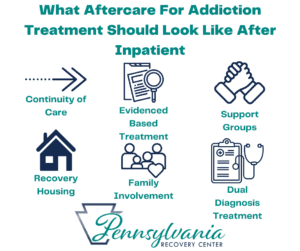When it comes to addiction treatment, the journey doesn’t end once a person completes a program. In fact, aftercare is a crucial component of the recovery process. Aftercare refers to the ongoing support and services that help individuals maintain their sobriety and prevent relapse. Here, we will discuss the importance of aftercare in addiction treatment.
Continuing Support
After completing a rehab program, individuals may face numerous challenges as they transition back to their normal lives. These challenges can include triggers, cravings, and stressors that can potentially lead to relapse. Aftercare provides ongoing support to help individuals navigate these challenges and stay on the path to recovery. This support can come in the form of therapy, support groups, sober living arrangements, and other resources that cater to the individual’s needs.
Preventing Relapse
Relapse is a common occurrence in addiction recovery, and it can happen to anyone, regardless of how long they have been sober. Aftercare plays a vital role in preventing relapse by offering tools and strategies to help individuals cope with triggers and cravings. Through continued therapy, education, and peer support, individuals can learn how to recognize and manage relapse warning signs before they escalate.
Accountability and Monitoring
Aftercare programs often involve regular check-ins and monitoring to ensure that individuals are staying on track with their recovery goals. This accountability can be instrumental in helping individuals stay focused and motivated to maintain their sobriety. Knowing that they have a support system keeping an eye on their progress can provide individuals with a sense of security and reassurance as they navigate the challenges of life after addiction treatment.
Building a Sober Lifestyle
Recovery is not just about abstaining from drugs or alcohol; it is about creating a new way of life that supports sobriety. Aftercare programs help individuals build a sober lifestyle by providing them with the tools and resources they need to make healthy choices and cultivate positive habits. This may include assistance with finding employment, housing, and ongoing therapy to address any underlying issues that may contribute to addictive behaviors.
Supporting Mental Health
Addiction is often intertwined with mental health issues such as depression, anxiety, and trauma. Aftercare programs address these co-occurring disorders by offering therapy, medication management, and other mental health services to help individuals maintain their sobriety and improve their overall well-being. Supporting mental health is essential in addiction recovery, as untreated mental health issues can increase the risk of relapse.
Conclusion
Aftercare is a vital component of addiction treatment that provides individuals with the support, tools, and resources they need to maintain their sobriety and prevent relapse. By offering continuing care, accountability, and assistance in building a sober lifestyle, aftercare programs help individuals transition back to their normal lives with confidence and resilience. If you or someone you know is struggling with addiction, consider the importance of aftercare in the recovery process.
Remember, recovery is a journey, and aftercare is there to support you every step of the way.
Take the first step towards a brighter future by prioritizing your ongoing care and well-being.
Don’t hesitate to reach out and seek help. You deserve a life free from the grips of addiction.
You are not alone in this journey. Aftercare is here to guide you towards a healthier, happier, and sober life.
